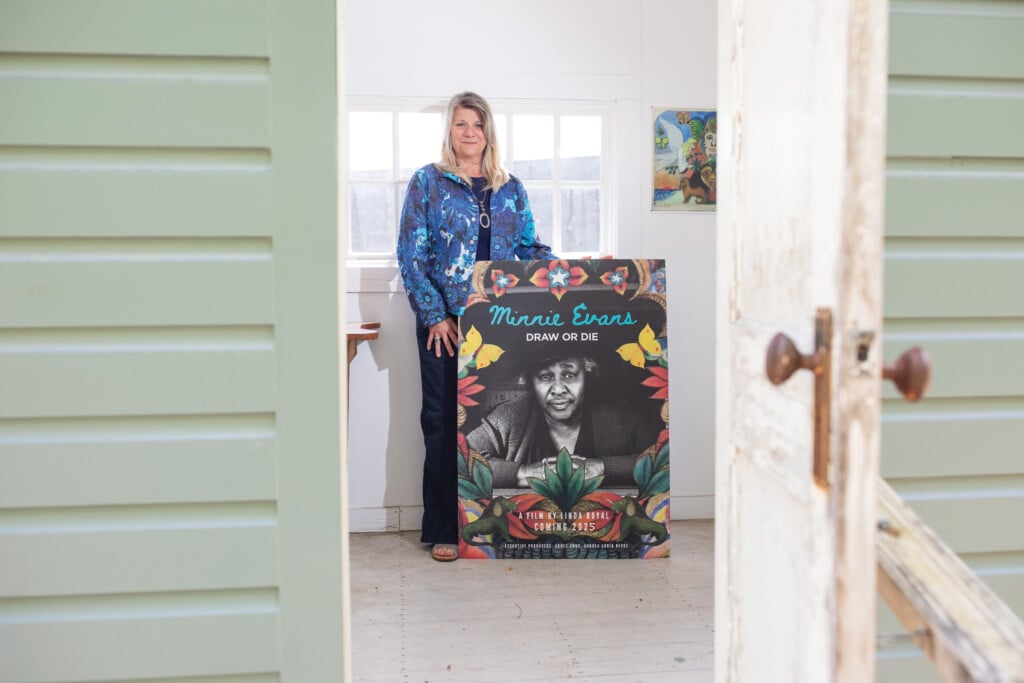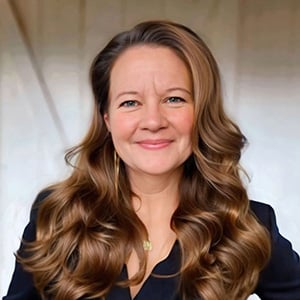Looking Up
Casey Roman writes about her travels and lessons learned
CASEY ROMAN moved to Wilmington in 2008 for an on-air news reporter gig. Her life turned upside down a decade later when she lost her career, her house, and any desire to stay put. After transforming a cargo van into a home, she set out on what would become a 12,000-mile solo trip and the inspiration behind her book, Looking Up.
Roman, whose degree is in business administration, jokes that she “had no business working in news,” but eventually it became a crucial part of her identity. “The only way I knew how to introduce myself those ten years was, ‘Casey Roman, WECT news,’” she says. After losing her job, Roman found it especially challenging to not only find employment, but any purpose to her life in Wilmington. “I had moved here for that job,” she explains. “So if I didn’t have that job, why was I still here?”
After selling her house in the summer of 2018, a van outside of a local dealership that she passed daily caught Roman’s eye. “I was just like, ‘that’s what I need,’” she says. “I need a house that no one can take away from me and I can just move with it. So I put this master plan together and started to think that it was the answer to all my problems.”
Roman and a few of her friends worked on the van together for a handful of months until late February 2019, when Roman and eight days’ worth of clothes and food hit the road. At that point, she envisioned a three-week trip. She would end up living in that van for eight months.
During that time, Roman started a popular YouTube channel about her life on the road and the assortment of strangers she’d come across through her travels. Eventually Roman decided to combine her experiences and the stories of those she met during her trip into a book, Looking Up.
“When I left town, it was just about getting away,” Roman says. “I needed to stop being ‘the news lady’ and start just being Casey and fade into the background. I didn’t set out thinking I’d start a YouTube channel or write a book, I just wanted everyone to sort of forget who I was. And that didn’t happen!”
Take 5 with Casey Roman
Was there anything from your old life in news that helped in your new one on the road? “Definitely – I think as I lived all over the country, I found it really easy to talk to anybody and I could always find something in common. I loved the adrenaline and storytelling in news and found that again. In both spaces, every day is a surprise.”
What was your mental space like leading up to the decision to head out in the van? “I was barely hanging on in the summertime because I had lost everything; my house was gone, my job was disappearing. And moreover, all of my relevancy was lost. Every blueprint that I had ever laid was being erased. People who’ve read the book are like, ‘Oh my God, you’re so brave.’ No, I wasn’t brave. I was out of options. And ironically, having nothing made me very fearless. There was nothing to lose.”
Obviously, a lot of things led to you hitting the road – losing the job, the house, finding the van – but was there a moment when all that clicked into place for you, and you decided to go? “I was in the vacant house, and my mother called and told me my grandmother had died. She was one of those people that time could not beat and now she was gone. The book is called Looking Up because I just envisioned her looking at a hospital ceiling, and that was the end. And it gave me a lot of perspective about time, and it made me very aware of how fast it was moving.”
When did your experience shift from just, “I have to get out of my current reality” to what would eventually become your book? “I sort of always knew – it’s an adventure if you’re on a hero’s journey; otherwise, you’re just some lady living in a cargo van with nowhere to go back to. When I was in upstate New York this family invited me to live in their backyard. And I don’t know them from Adam, but they’re fine with me and I’m fine with them. The next day, one of their cows goes into labor, and I get to help her with this baby cow, which was the most spectacular thing in the whole world. At that point I was putting videos of my experiences on YouTube – I threw myself into editing, writing, and videoing about what can happen out there when you trust your fellow American – and mostly the cow, I was obsessed with the cow. … That was a story worth telling and not just on YouTube. I knew that at some point I needed to find where all these stories about small-town America and the people and their stories could be told.” The chapters in your book are listed as lessons.
Is there any lesson you’d want to make sure readers are left with? “I know there’s a lot of people who deal with a level of mental health issues like I do, and I wanted people to know that I wasn’t anybody special. …There was nothing spectacular about me, but I still did it. So, in some way I want people to know: You don’t have a great excuse.”
Want more WILMA? Click here to sign up for our WILMA newsletters and announcements.




